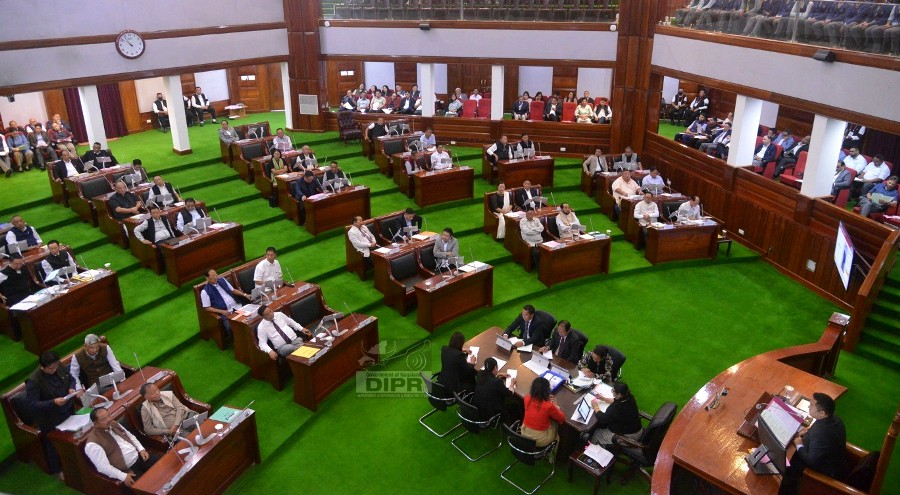Nagaland MLAs call for a dedicated Indigenous Affairs dept. to protect native rights, monitor immigration, and preserve cultural identity
Share

KOHIMA — The issue of safeguarding indigenous rights headlined the concluding day of the Seventh Session of the 14th Nagaland Legislative Assembly, with legislators voicing concern over unchecked immigration, demographic shifts, and gradual cultural erosion.
Senior NLA members called for stronger structural safeguards, including the creation of a dedicated Department of Indigenous Affairs, to protect the identity and survival of Nagaland’s indigenous people.
Initiating a discussion under Rule 50 on ‘Safeguarding the Rights of Indigenous Communities,’ Leader of NPF Legislature Party, Kuzholuzo Nienu, cautioned that unchecked immigration posed a grave threat to the future of the Nagas.
Citing reports on social media that nearly 200 vehicles carrying suspected illegal immigrants had recently attempted to enter Nagaland, Nienu said that the influx was already visible on the ground.
Also read: Nagaland government to set up panel on Tuli paper mill
According to him, many outsiders had not only acquired land but also manipulated documents, run businesses, and managed to get enrolled in the electoral rolls using forged papers.
Nienu asserted that for indigenous communities, land remains the foundation of survival. “We have every right to decide who will enter our lands, how we live, what we eat, how we govern ourselves, and how we engage with the land and environment,” he said.
While acknowledging safeguards such as the Inner Line Permit (ILP) and the Register of Indigenous Inhabitants of Nagaland (RIIN), he questioned their effectiveness.
More from 14th NLA Sessions: Reservation rethink: NPP’s Dr. Rhutso calls for new ‘General’ and ‘Reservation’ categories in Nagaland policy
He said that the RIIN process had barely been implemented and warned that slow, silent assimilation through intermarriage, land leasing, and gradual settlement was already eroding indigenous identity. “If this trend continues, our children will grow up as strangers in their own homeland—speaking others’ languages, farming others’ land, and living under others’ rules,” Nienu claimed.
He pointed to global and regional examples where demographic imbalance has destabilised indigenous societies, adding that Nagas must learn from such experiences.
Clarifying that the issue was not about exclusion, he said that Nagas are known for their hospitality, “but hospitality must never become a tool for erasure.”
He also warned that weak legal frameworks and ineffective governance leave indigenous people vulnerable to exploitation, with traditional knowledge ignored, seeds replaced, lands taken without consent, and communities pushed to the margins.
Quoting the Jokai Declaration of the North East Indigenous People’s Forum, Nienu urged the establishment of dedicated Indigenous Affairs departments in all Northeastern states.
He suggested practical steps such as a state-wide, door-to-door census of non-locals covering shops, trades, vehicles, daily wage earners, and floating populations, with the findings published to raise awareness.
He also recommended modern surveillance at entry points such as Dimapur, Peren, Niuland, Wokha, Mokokchung, Longleng, and Mon, along with the setting up of deportation centres.
Other legislators expressed similar concerns. Minister Jacob Zhimomi underlined the constitutional uniqueness of Nagaland under Article 371(A).
He urged citizens to focus on upskilling and reducing dependency while staying alert and optimistic about the state’s future.
Legislator Dr. Neisatuo Mero stressed the possible socio-economic and political effects of immigration, warning that without preventive measures, demographic exploitation could threaten languages, customs, and identity, eventually leading to cultural extinction. He supported the demand for a Department of Indigenous Affairs.
Dr. Sukhato A Sema echoed this view, stressing the need for a robust administrative mechanism to monitor and protect the rights of indigenous people, their land, and future generations.
Advisor Dr. Kekhrielhoulie Yhome highlighted the role of the legal system in strengthening local governance and self-administration, which he said was necessary to design and implement policies that protect indigenous rights.
Advisor KT Sukhalu called for the creation of fixed-pay posts for language teachers, ensuring that students continue to learn and preserve their own languages.
OBC status for Gorkhas
Raising a related issue, MLA Dr. Tseilhoutuo Rhutso drew attention to the Gorkha community in Nagaland, recognised as indigenous non-Naga inhabitants under a 1974 Home Department order.
The order covered families settled in the state before 1940, numbering 166 at the time, but the figure has since grown to over 1,400.
Rhutso said the failure to record births and deaths of these families between 1982 and 2016 had created administrative hurdles, leaving many unable to obtain proper certification.
He explained that the community cannot avail Scheduled Tribe benefits or even secure OBC recognition, resulting in difficulties in education and employment.
To address this, Rhutso proposed that the state government recommend OBC status for the Gorkhas so they can access central government schemes without affecting the employment rights of Nagas at the state level.
He also suggested restarting the Nepalese programme on All India Radio, which was discontinued, to ensure representation of the community in the public sphere.